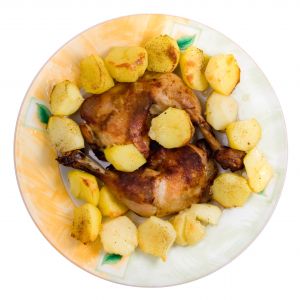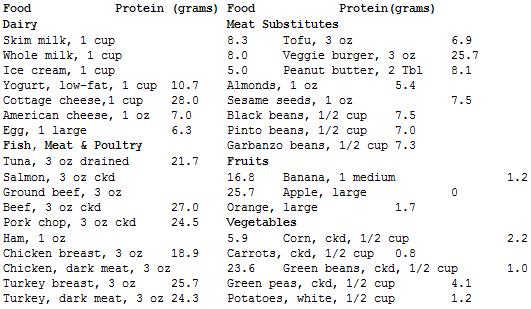 Q: How do you supplement your strength training with protein with a decreased consumption of meat? I tried to go vegetarian once and my strength gains deteriorated rapidly.
Q: How do you supplement your strength training with protein with a decreased consumption of meat? I tried to go vegetarian once and my strength gains deteriorated rapidly.
A: I’d expect that to happen because protein – something that meat is chock full of – is a key component of muscle building. Cut your protein intake, and you cut your muscle developing abilities. It’s that simple.
In my mind, the more items you cut from your daily intake, the more cognizant you have to be of your nutrition. It’s just that simple. Know what you’re cutting out, and create a plan for making sure you can replace it adequately.
Today, that “something” is protein.
Realistically speaking, considering the amount of meat and animal byproduct most of us eat every day, most of us get far too much protein in our diets. There are a lot of blanket statements about how much is best (“about 1g for every kg you weigh, so for a 150lb person, 75g of protein” or “about 1g for every pound you weigh” or “15% of your caloric intake”) but you just have to keep testing out what works best for you and what’ll keep you going for your particular goals. It seems like it might be tough because you’d think that, as strength trainers, we’d want all the muscle builders we can get. However, with protein also comes calories and since we have to be mindful of caloric intake, we also have to make sure that we’re not eating an excess. An excess of anything is an issue for us.
Animal and animal byproduct has long been a source of protein for humans. It’s in the eggs. It’s in the milk. It’s in the cheese. It’s in the muscle meat. It’s in the organs. It’s in all of it. While there are plenty other sources of protein, we tend to rely the most upon lean meats. It’s a place where you can get protein with little fat, little carbohydrates… little anything else, really. That’s what’s made it so ideal for those of us who are strength trainers – a protein source with little fat and a controlled calorie count? Pfft – a lean steak or chicken breast makes you happy.
But what happens when you decide to start cutting the meat? Reasoning for your decision aside, you have to keep in mind the amount of meat you were taking in, the amount of protein that meat provided you and a plan of action for replacing it. Lucky for you, this is easy peasy.
First… protein is in practically everything. No, look:
The nuts you eat? Protein. The seeds (sunflower, pumpkin, flax, hemp) you chomp? Protein. There’s protein in the fruits you scarf down. There’s protein in the veggies you steam, saute and grill. So while you might be cutting out a big source of protein via meat, you’re not completely down for the count.
I’m a bean eater. I mean, it’s just my thing. Kidney beans, black beans, navy beans, chickpeas, black eyed peas… I like my beans. They’re also full of protein. I mean, I stuff my vegetarian (or vegan) dinners with beans, and all is well on my plate. The average half-cup of black beans alone has at least 6 grams of protein in the cup, and also has a load of fiber, too. (“Beans, beans, the musical fruit…”)
I’m also a big broccoli fan. There’s just something sweet in the bite of a broccoli stalk… and I could easily – easily – eat a cup or two of it in one sitting, with a little garlic and ginger. That, alone, is about 4 grams of broccoli per cup.
There’s protein in peanut butter: 8g for every 2 tablespoons. There’s protein in bananas: 1g. It’s everywhere.
I keep saying that because it needs to be understood – vegetarians and vegans? They can get their protein just fine. There’s also soy protein and protein powders, but…. I don’t have any experience with those.
These are small amounts compared to the amount of protein in a chicken breast – 47g – but if you are compelled to forego that for private reasons (none of which I care to judge), then you make a way.
How do you build a plate without meat or animal byproduct, though? Easy. The same way you make a space for meat protein on your plate, you make a space for non-meat protein. Making stir-fry? Add some mushrooms and peanuts or sesame seeds! Making a salad? Add some pumpkin seeds or walnuts to it! Snack on an almond/cranberry blend during the day. Eat oatmeal for breakfast. Scarf down some quinoa mixed with fruits for lunch. Lots of different clean options, here. You’ve just got to be creative in how you handle them.
Now, it’s easier if you’re eating animal by-products and not animal meat, because you can get in your protein through yogurt, cheeses or eggs. You can top a salad with cheese or eat a cheese and nut blend for a snack. I mean, really… there’s so much that you can do, here. You just have to get creative with it, and strangely enough, that makes it that much more fun.
That being said, here are a few resources to help you learn about the protein content of some non-meat sources to help you plan accordingly if you plan to convert away from eating meat.
- Protein In The Vegan Diet
- Protein: How Much Should You Eat? (Harvard School of Public Health)
- Northwestern University Protein Fact Sheet
- Vegetarian Protein Sources: Getting Enough Protein
- Where Do Vegans Get Their Protein?
- On Complete and Incomplete Protein Sources


13 comments
Thank you for this! I took a nutrition course this semester and we veggies/vegans received SO much flack! It was ridiculous.
Anyway, one of my other fave bloggers is Lindsay Nixon and HappyHerbivore.com and whenever people ask her this question she always responds with, “Where do omnivores get their fiber?” I’ve started doing this and I must say…its quite fun.
It makes me sad that our society is so undereducated (medical professionals as well since my doc freaked when she found out that I was trying to lose weight AND become a vegetarian…apparently all we eat are grains…none of that VEGETABLE stuff our name implies…and grains can be fattening) about protein sources.
So thank you for addressing this topic. I have been a vegetarian for 2 years now and all but one time have been ok with my protein (right after I amped up my power yoga classes and well…I didn’t think it through). I use almond butter and high protein/fiber toast (love going to bakeries) for breakfast, greek yogurt, fruit, and nut granola for a snack, and some sort of bean or tofu entree (salad, stir-fry, etc) everyday.
There’s also the NoMeatAthlete.com, too.
I started to do the “Well, where do you get your vitamin B and fiber?” thing in this post, because it IS particularly annoying when people who don’t know squat about food all of a sudden are nutrition experts… but I feel like the more harmful part of that question is the fact that the mere ASKING of it leads people to believe that there is a legitimate issue, there… and there isn’t. It just… doesn’t make sense. It’s kind of caught on like some silly “way to shut down vegs.” It’s annoying.
This is a great article. I’m not vegetarian but growing up in a household with a vegetarian father and a very non-vegetarian mother a vegetarian diet comes just as naturally to me as a non-vegetarian one. I tend to listen to my body and there are times when I crave meat (usually beef…lol) and times when I can go days without. This article let’s me know that I’m on the right track when it comes to keeping protein in my diet whether I choose to eat meat or not.
The first two things I look for when buying food, especially grain, snacks and *select* prepared foods are the protein and fiber content. Next I look at sugar and sodium content. If those two things are in check I then look at calorie and fat content and decide of whether the protein and fiber content warrant the calories. If it’s a prepared item I look at the ingredients to decide if it’s worth buying and putting in my body at all.
I know I’ve kinda gone off on a tangent but I believe this guide can be useful whether you choose to eat meat or not.
Great post! I’ve bought several bags of dried beans (both cheap and healthy) to try to diversify my protein source!
Thanks for posting those resources!
Thank you SO much for posting this! I can’t wait to link it because I’m always asked how I get my protein!
I was thinking of No Meat Athlete when I read this. I’ve also read other vegan or vegetarian bloggers who basically say: we focus too much on protein. We basically get enough.
I’ve also seen the “do you get enough fiber” retort, etc. Those are funny to me.
Great post. When I started y eating healthy journey, my not eating meat was the least of my troubles. eating processed food was a far bigger challenge because it our society even so called vegetarian & vegan food is processed and can end up with you eating too much slat & sugar.
High five! I’m sharing this because I get tired of repeating myself 🙂
I recently made a transition to being vegetarian and despite no meat I have not received any problems. As the blog says protein is everywhere and especially as I’ve had to avoid red meat being a vegetarian I never worried about my protein intake. Being vegetarian has worked out better for me (cos I was a bad meat eater) just we need to kno how to be a good eater full stop. Meat or no meat. I just happen to get my protein from the same place the animals get the protein from 😉
I’m rarely on the receiving end of that question anymore. When I am, I just look the person straight in the eye, “Oh, I don’t get any protein.” Have yet to hear a comeback to that. Stops the conversation cold.
Personally, I think some people just dont know and are asking for education purposes. For one, I am seriously rethinking my food choices and I am considering becoming a vegeterian. I think it is an appropriate question to ask someone who is already a vegetarian.
If you want to change and do something different – go to those who are already doing it and doing it well. It should be looked at as a “teaching” opportunity.
I sincerely don’t believe that every person asking is being cynical or disrespectful about it. I DO think, however, that its used as some kind of smackdown point to try to make people feel silly or wrong about their choices. As you make your path toward decreasing your meat consumption, you, too, will hear the inevitable “YOU AINT GON GET ENOUGH PROTEIN” and then you’ll understand what we’re getting at, here. LOL
Thanks for the article. My belief is that a plant based diet is exceptionally healthy, and as you have pointed out, is abundant in the plant kingdom. Plants also have the fibre and phytonutrients that are lacking in meat.
Comments are closed.